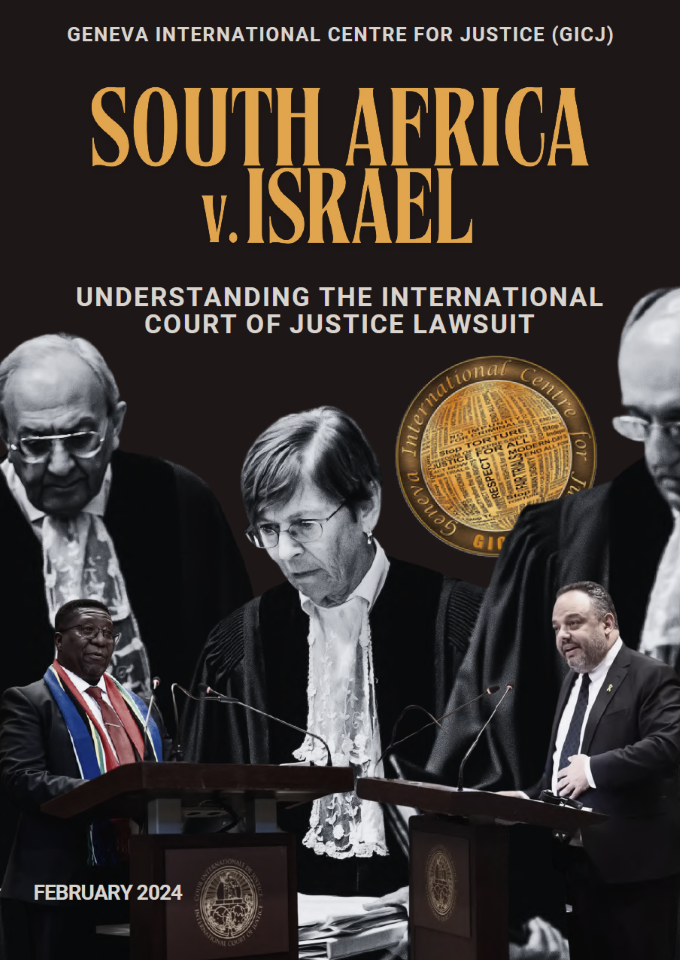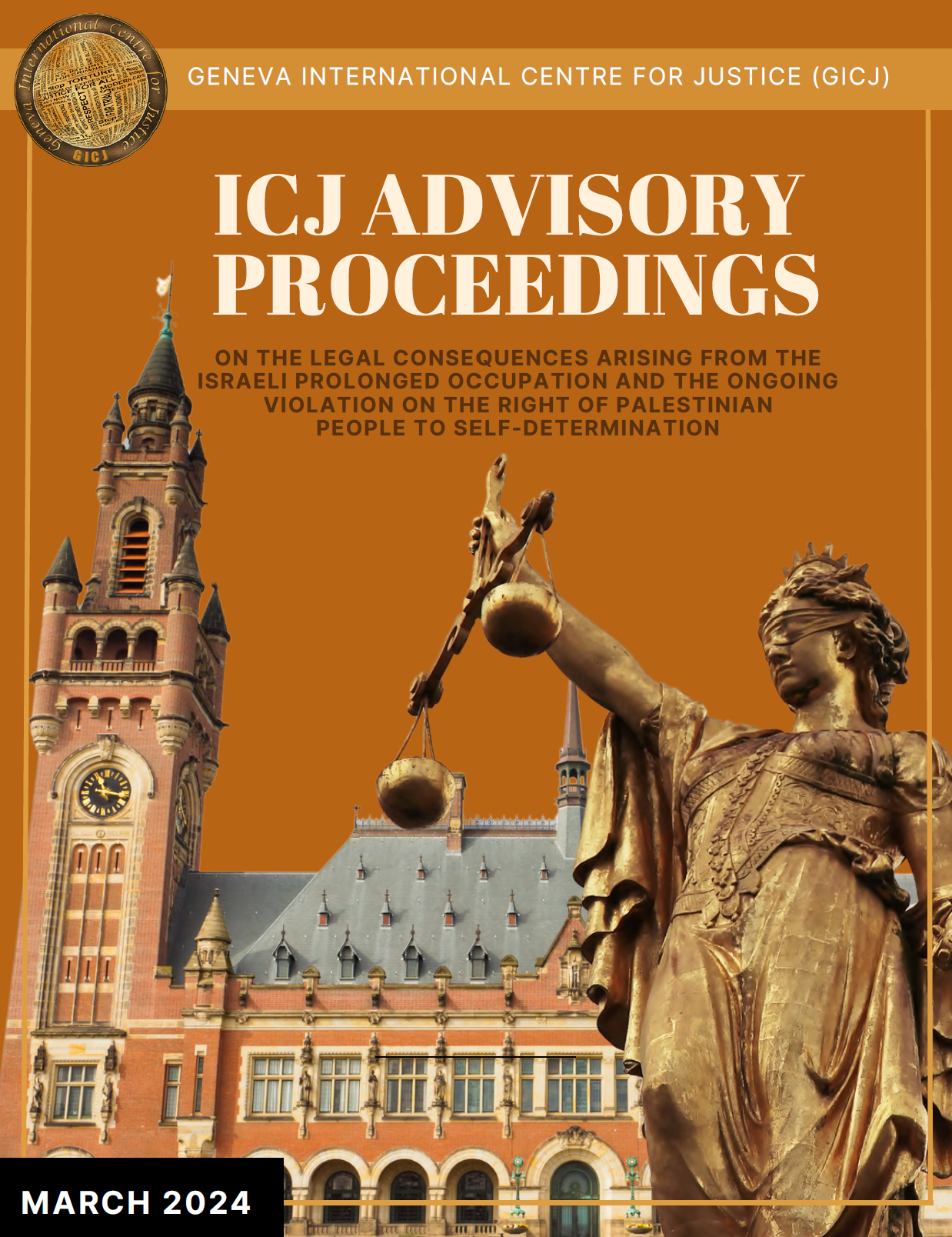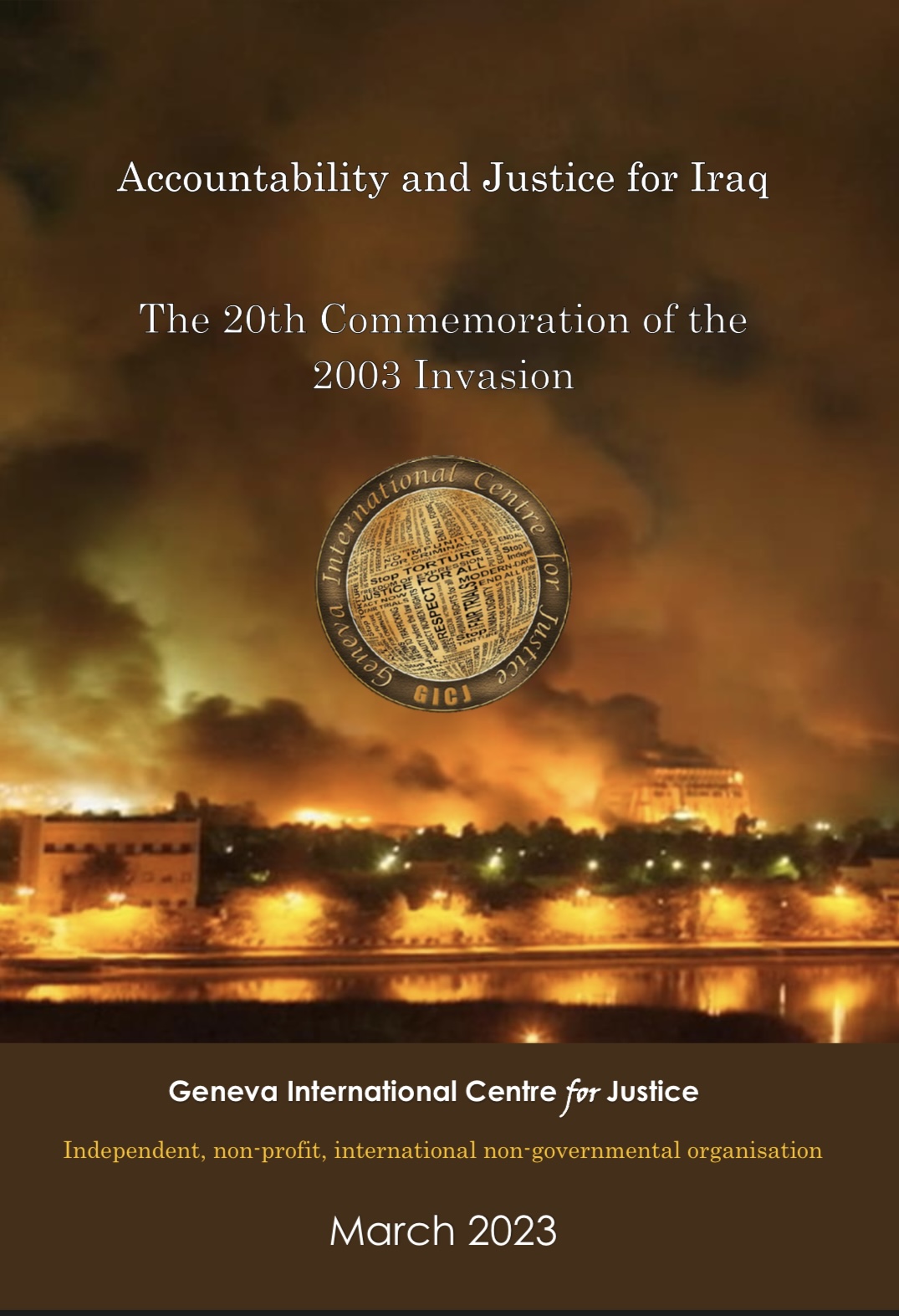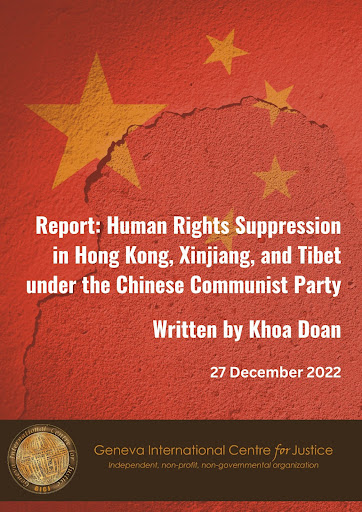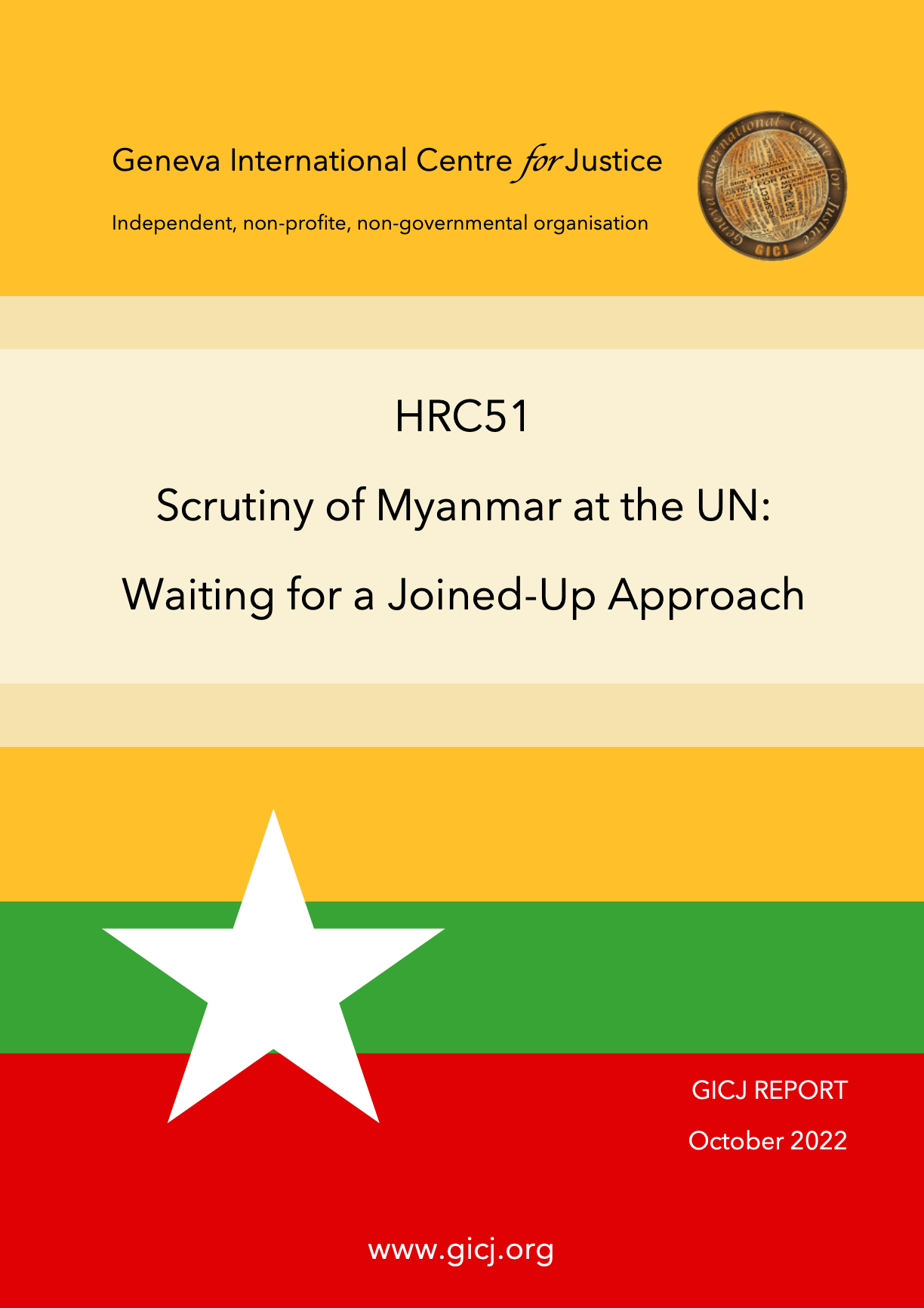The 52nd Session of the Human Rights Council
27 February - 4 April 2023
Item 2: Enhanced Interactive Dialogue on the Report of the Commission on Human Rights in South Sudan
7 March 2023
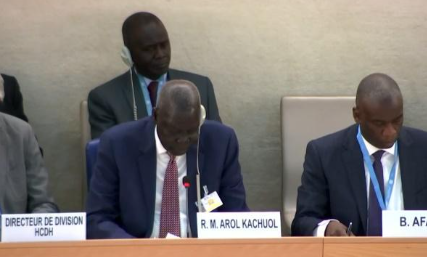
By Aimara Pujadas Clavel / GICJ
Executive summary
On the 7th of March 2023, at the 52nd Session of the Human Rights Council Volker Türk, United Nations High Commissioner for Human Rights, and Andrew Clapham, on behalf of the UN Commission on Human Rights in South Sudan, presented the annual report of the Commission.
Based on investigations undertaken in the country the report identified widespread attacks against civilians, systematic sexual violence against women and girls, unlawful detentions, the ongoing presence of child soldiers, and State-sponsored extrajudicial killings.
During the interactive dialogue concerns were raised about the current atmosphere of fear, repression and humanitarian crisis in the country, with senior public officials and military officers allegedly being responsible for crimes against people demanding civic rights and yet enjoying impunity for their gross human rights violations.
Calls were made for the government to guarantee human rights protection, as well as foment the necessary dialogue with civic actors to achieve durable peace.
Geneva International Centre for Justice (GICJ) encourages the South Sudanese government to provide assistance to people in need, particularly children who suffer the devastating effects of the ongoing instability. The government should guarantee human rights protection, and initiate dialogue with civic actors to achieve durable peace.
Background
The Commission on Human Rights in South Sudan was established by the Human Rights Council for a one-year term on the 23rd of March 2016 by resolution 31/20, and it has been subsequently extended up to the present day.
The Commission's mandate is to determine and report the facts and circumstances of, collect and preserve evidence of, and clarify responsibility for alleged gross violations and abuses of human rights and related crimes, including sexual and gender-based violence and ethnic violence, with a view to ending impunity and providing accountability.
In its latest report, presented during the 52nd Session of the Human Rights Council, deep concern was raised regarding the impunity prevailing in South Sudan, which is a major driver of the human rights and humanitarian crises, causing immense trauma and suffering for civilians in the country.
Summary of the UN Report
The Commission stressed the many challenges of a country ruled by an atmosphere of fear and repression, reducing civic space and constantly attacking citizens participating in legitimate civic activities, such as organising meetings in public spaces, creating and sharing petitions, attending peaceful protests and conducting regular journalism activities.
Unlawful killings by State agents were also reported, showing patterns of gross violations of the State’s international human rights law obligations to respect the Right to Life of their people. According to the findings of the Commission, South Sudan has constantly failed to investigate, prosecute and punish these acts, which not only fosters an environment of impunity but also represents further violations of the State’s obligations.
Children and women are the most affected by the ongoing instability, which has a profound impact on access to health, food, education and other basic services, and has therefore escalated the humanitarian crisis within South Sudan.
The report also recognised that some limited progress has been made on transitional justice, with steps towards establishing the Commission on Truth, Reconciliation and Healing under the Revitalised Peace Agreement, alongside the drafting of the Bill for this Commission, as well as the Compensation and Reparation Authority Bill.
Interactive dialogue
 Volker Türk, UN High Commissioner for Human Rights started the interactive dialogue by stressing how he was appalled by the current situation in South Sudan. Despite calls for a ceasefire and the implementation of the Peace Agreement, conflict and clashes across the country are resulting in a raft of human rights violations and abuses against their people.
Volker Türk, UN High Commissioner for Human Rights started the interactive dialogue by stressing how he was appalled by the current situation in South Sudan. Despite calls for a ceasefire and the implementation of the Peace Agreement, conflict and clashes across the country are resulting in a raft of human rights violations and abuses against their people.
The Commissioner highlighted the staggering number of victims affected by human rights abuses within South Sudan.
 Between January and December 2022, the Human Rights Division documented 714 incidents of violence affecting 3,469 civilians. He also noted the limited civic and political space prevalent in the country, with numerous journalists and human rights defenders abducted, harassed, intimidated and arbitrarily detained.
Between January and December 2022, the Human Rights Division documented 714 incidents of violence affecting 3,469 civilians. He also noted the limited civic and political space prevalent in the country, with numerous journalists and human rights defenders abducted, harassed, intimidated and arbitrarily detained.
Andrew Clapham, on behalf of the UN Commission on Human Rights in South Sudan, emphasised the horrendous crimes committed in cities such as Leer, Tonj North, Mayom and Upper Nile, and how terror and trauma were being instituted by attackers who completely destroyed the livelihoods of communities already experiencing famine-like conditions, exacerbating the dire humanitarian situation.
Hon. Justice Ruben Madol Arol, Minister of Justice and Constitutional Affairs of South Sudan responding to the report, stated that the Government has fully implemented the Action Plan for the Armed Forces on Addressing Conflict-Related Sexual Violence in South Sudan through public awareness initiatives, centralisation of forces, and prosecution of offenders. He criticised the methodology used by the Commission, which he qualified as profoundly flawed, while also mentioning that the report contained recycled allegations from previous reports dating back to 2013.
The delegate of the European Union noted that only partial and slow progress had been achieved in implementing the 2018 Revitalised Peace Agreement and called for a peaceful and just transition in light of the upcoming elections, which were postponed to late 2024.
The representative expressed concern about the continuous violence, displacements and gross human rights violations and abuses, including sexual and gender-based violence, taking place in the country.
The Norwegian Ambassador, on behalf of the Nordic-Baltic countries, regretted that a renewed sense of urgency has not accompanied the extension of the Peace Agreement in its implementation. She urged the parties to make immediate progress on security arrangements, transitional justice and the rule of law to put an end to the political violence and insecurity in the country.
Agreement in its implementation. She urged the parties to make immediate progress on security arrangements, transitional justice and the rule of law to put an end to the political violence and insecurity in the country.
The delegate raised concerns about the large-scale diversion of public revenues, which undermines South Sudan’s ability to fulfil its human rights obligations, and urged the government to strengthen its financial management systems and use more of its own resources to address the needs of its people.
The delegate of Côte d'Ivoire, on behalf of the African Group, stressed the conviction that the Commission on Human Rights on South Sudan should support constructive engagement with the Government of South Sudan in promoting universal respect and protection of human rights. The State representative called on the international community to provide all necessary support to the implementation of the transitional justice, accountability, reconciliation and healing processes, in cooperation with Southern Sudan, IGAD and the AU.
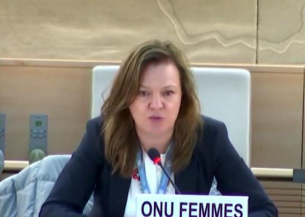 The UN Women representative emphasised that the pervasiveness and impact of sexual violence need to be confronted and should be addressed in future efforts aimed at acknowledgement, repair and redress. She expressed concern about the low rate of participation of women in the consultations on the establishment of a truth and reconciliation commission, and she took the opportunity to urge the State to close this gender gap.
The UN Women representative emphasised that the pervasiveness and impact of sexual violence need to be confronted and should be addressed in future efforts aimed at acknowledgement, repair and redress. She expressed concern about the low rate of participation of women in the consultations on the establishment of a truth and reconciliation commission, and she took the opportunity to urge the State to close this gender gap.
The delegate for the United States of America stated that the protracted human rights crisis in South Sudan is mainly related to the sharp rise in subnational conflict over the past year. He renewed the USA’s call for South Sudan’s leaders to act with urgency to end sub-national violence and to hold accountable those responsible for attacks targeting civilians and humanitarian organisations, as well as for abductions and other human rights violations.
The representative of the Democratic People's Republic of Korea criticised the report, highlighting that they are of the view that any debate based on prejudice is not conducive but counterproductive to the genuine promotion and protection of human rights and therefore such practices should be discontinued.
prejudice is not conducive but counterproductive to the genuine promotion and protection of human rights and therefore such practices should be discontinued.
The delegate stated the genuine willingness and preparedness of the government of South Sudan for the promotion and protection of human rights and its efforts to preserve the peace and stability of the country should be duly respected and further encouraged. He also urged the HRC and the OHCHR to avoid politicisation, selectivity and double standards in the field of human rights, and encourage constructive dialogue and cooperation to promote understanding of the different realities and to explore effective ways to promote and protect human rights
The delegate of the Bolivarian Republic of Venezuela reiterated its government's opposition to the politicised initiatives of some hegemonic countries against South Sudan, which violate the universal principles of respect for sovereignty and non-interference in the internal affairs of states, enshrined in the UN Charter.
The representative noted that South Sudan has shown its willingness to make progress in promoting and protecting the human rights of its people and that the country is progressing along the path of dialogue and understanding, towards peace and national reconciliation. He also underlined the importance of cooperation, technical assistance and capacity building, always with the consent of the State concerned, to help improve the human rights situation anywhere in the world.
The Senegalese delegation highlighted that the civilian populations of Southern Sudan continue to suffer the cumulative and aggravated effects of years of armed conflict, food insecurity and climatic hazards. He reiterated concerns about the worsening of the humanitarian situation prevailing in the country. He also underscored that strengthened cooperation with the Human Rights Council and its various mechanisms will make it possible to consolidate the achievements as well as the legal and institutional framework for the protection and promotion of human rights, a guarantee of peace, stability and economic development.
The participant non-governmental organisations unanimously condemned the serious human rights violations reported by the Commission on Human Rights in South Sudan.
Concerns were raised about child executions conducted by the State since at least 2017, despite the Transitional Constitution and Child Act prohibiting capital punishment on children. NGOs also condemned the imprisonment of children in adult prisons at the state level, putting them at elevated risk of abuse or violence; and urged the State to conduct a thorough, impartial, and independent investigation into all uses of the death penalty on children since 2011. They also encouraged all Council members to support the renewal of the Commission’s mandate and for South Sudan to deepen its cooperation with the Commission including through the implementation of recommendations.
Position of Geneva International Centre for Justice
Geneva International Centre for Justice (GICJ) is deeply concerned by the findings of the Commission on Human Rights in South Sudan and the reported lack of civic and political dialogue, key elements for durable peace processes. In light of the crimes and atrocities committed, impunity and weak judicial infrastructure are catalysts of conflict and instability, and therefore, the state should immediately act to put an end to the flagrant human rights violations perpetrated by state-related actors.
GICJ urges the Government to uphold its obligations under international humanitarian and human rights law, by protecting civilians from attack and ensuring accountability for violations.
In view of the elections scheduled for December 2024, the participation of civil society and respect for fundamental freedoms must be guaranteed as they are essential conditions for the consolidation of peace and the strengthening of Southern Sudanese institutions.
#HRC52 #SouthSudan #endtoimpunity #HumanRightsViolations #High_Commissioner #Justice #Human_Rights #Women’sRights #childrenrights #humanitarianassistance #conflicts #peace #Geneva #Geneva4justice #GICJ #Geneva_International_Centre_for_Justice#Human_Rights_Council #Democratic #Regular_Session







